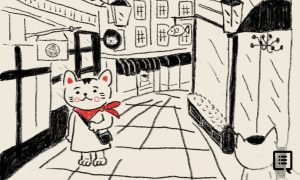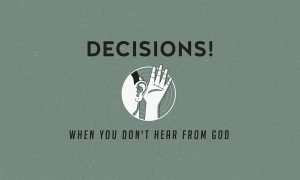Not the Way I Saw It Going in My Head: On Second-Guessing Decisions
A reader of my website phrased it best:
[My husband] and I have wrestled with our “calling” to adopt years ago. We clearly felt it, and we have second guessed it almost every day since then, wondering what were we thinking? Did God really call us to this or were we just emotionally carried away?
I think in my naïveté, I assume that if I obey what I think God is clearly placing on my heart, he will “reward” me somehow with happiness and not trouble. My very wise husband points out that this is very bad theology!
I knew the reader’s pain. These thoughts reminded me of an article I’d submitted to a significant new client early in my writing career. On top of spending hours tweaking words and praying about that piece, specifically for God’s generous wisdom (James 1:5-6), seeing the vast ministry potential for my writing filled me with confidence in God’s favour, which I assumed would be displayed in success with my client.
In the end, however, the client emailed to say, with little explanation after three of my pieces, that they wouldn’t be accepting any more submissions from me for a while. I was crushed.
So often I tended to think, “If I’m trusting God, leaning not on my own understanding, praying for wisdom, and all that excellent jazz—somehow, I will be shielded from failure.“ And of course, there’s some truth in there. Walking in God’s ways unquestionably shields us from so much error, heartache, and, well, stupidity.
But in that situation, I had to admit that like the Israelites rushing into battle with the Ark of the Covenant (1 Samuel 4), I was using God as a protective layer, a guarantee.
Of course, avoiding wrong and following the Holy Spirit is a little like Aslan pushing forward spring wherever he goes: Things come alive when God is in them. Yet perhaps I’m forgetting that Jesus, my forerunner, walked straight into God’s will—and straight into death.
Rethinking “Open Doors”
A friend recently mused to me that he didn’t think God was “having favour” on him because, after he made a courageous decision, so many things were floundering and deflating around him. God must not be in this.
I wondered aloud to my friend about this whole theology of “closed” and “open” doors that seem to undergird so much of our decision-making as Christians.
Rather than carefully applying God’s Word to our decisions and growing in discernment with every issue we face (Hebrews 5:14), we might find it easier to identify borderline-superstitious signs, as if we were reading theological tea leaves that just tell us what to do already. Rather than fasting and praying, we might just apply an author’s way of doing things that worked for them, or blindly follow Christian-culture trends. Rather than consulting a multitude of counsellors (Proverbs 15:22), we might be tempted to tell others a rather bold “God told me”—granting our decisions His rubber stamp of approval.
Instead of trying to fast-track our choices, perhaps we can start with asking God to reveal where our hearts are at, so our desires and emotions don’t manage us from behind (Psalm 139:23-24). Pray thoughtfully through questions that seek wisdom rather than pat answers:
- What do I want and feel—both good and bad (Psalm 51:10, 139:23-24)?
- What does the whole of Your Word say about all aspects of this (Psalm 119:105, 2 Timothy 3:16-17)?
- What sin(s) could be keeping me from seeing clearly (Ephesians 4:17-19)?
- What would it look like to think about others as much as I do about my own problems (Philippians 2:3-4)?
- How do thoughtfulness, good judgment, understanding of Your character, and experience inform my decision making (Ephesians 5:15-16, James 3:17)?
- What would it look like to depend on You with my whole heart (Proverbs 3:5-6)?
Exchanging Short-Term Clarity for Long-Term Trust
Mother Teresa famously stated, “I have never had clarity; what I have always had is trust. So I will pray that you will trust God. In this world, there is no clarity. There is only love and action.”
To that end, even more than seeking wisdom, seeking God is my necessity in decision-making. A friend fasted for 40 days, hoping to hear God’s voice on the next steps in His life. At the end of the 40 days, my husband asked my friend if he’d discovered what to do. This friend replied, “God didn’t tell me what to do. But I know God so much better—so I now know what to do.”
Sometimes, I can be so eager for signs, for certainty from God and freedom from ambiguity and mystery, that I might even be making them up, like a thirsty person might conjure a mirage. It can feel dangerous, to sense that God was “in” something—or not in it—based on what I can see. Sometimes we have verses carelessly extracted—like Deuteronomy 28:13 that promises like “you will be the head and not the tail”; or verses about authority over all things (Matthew 28:18, John 14:13)—and they’re twisted to form God into some form of cosmic vending machine, rather than Job’s long view of, “Though He slay me, I will trust Him” (Job 13:15).
I love this Chinese folktale retold by American pastor Peter Scazzero in his book, Emotionally Healthy Spirituality: Unleash a Revolution in Your Life in Christ:
When a young man’s horse runs away and the village attempts to console its owner, his wise father asks, “What makes you so sure this is not a blessing?” When the horse returns alongside a beautiful stallion and everyone congratulates the young man, the wise man questions, “What makes you so sure this isn’t a disaster?” The son falls from the stallion, breaking his hip. Of course, everyone offers their sympathy–and again, the father: “What makes you so sure this is not a blessing?” Finally, when nomads invade the border, the Chinese lose 9 out of every 10 of the summoned able-bodied men. Because he is lame, the son survives to care for his father.
What Makes Us So Sure?
Looking back with what I know now, honest, humble evaluation embraces our capacity to improve, to learn. But perhaps, as my mum used to say, this is where we end up—I can’t deal God a card He can’t play. Despite very real consequences for my selfishness and foolishness, He can redeem even my poorest decisions (Genesis 50:20). And I can take His steadfast love to the bank even when decisions I made arm-in-arm with Him feel as if they’re combusting in my hands.
More than signs and wonders, I fiercely need an intimate knowledge of God, manifesting itself in wise, loving decisions. I may not be able to divine the outcome, but I can trust His character.
This week, I hope you can experience the settling peace, not of zero regrets, but of a fiercely loved child with a hope and a future.
Editor’s Note: This article was originally published on the writer’s blog here. This version has been edited by YMI.













Leave a Reply
Want to join the discussion?Feel free to contribute!